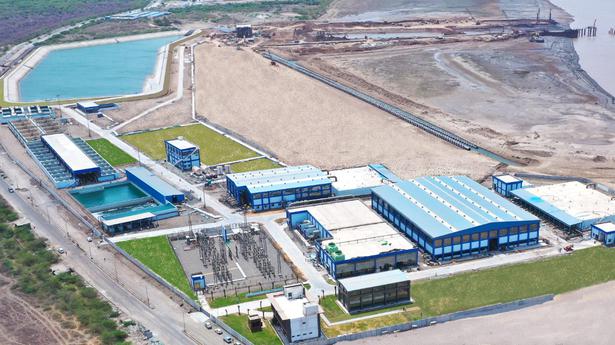
Gujarat sets up desalination plant for industries in Dahej
The Hindu
This is the first desalination plant of 100 MLD set up by any government in the country
For the first time in the country, the Gujarat Industrial Development Corporation (GIDC) commissioned the desalination plant at Dahej, supplying water to industries. The plant was officially inaugurated on June 17, but the government had put the plant under trial stage for a week’s time.
This is the first desalination plant of 100 MLD set up by any government in the country.
Dahej, a hub of major industries, is rapidly expanding with new industrial units. Currently, the daily requirement of water for the industries in Dahej is around 200 MLD, which is at present fetched from the Narmada river. The industries will now get treated sea water for their use.
“From this plant, 100 MLD water will be delivered daily to the industries in the area. The price of 1,000 litres of treated water will be ₹26,” said M. Thennarasan, MD of GIDC.
He added that the corporation has invested ₹881 crore for setting up the plant and its infrastructure.
Typical desalination plant handles only salinity (TDS-Total Dissolved Salts) as they draw water from open sea. This plant draws mix of river-sea water and has to handle the varying tide levels. The plant is located at the confluence of Narmada river Estuary at Rahiyad village in Dahej.
Prior to setting up a desalination plant, GIDC was supplying water to industries through Narmada Canal which was roughly costing around ₹48.50/KL but treated water from desalination plant will now be given at ₹26/ KL.

“Writing, in general, is a very solitary process,” says Yauvanika Chopra, Associate Director at The New India Foundation (NIF), which, earlier this year, announced the 12th edition of its NIF Book Fellowships for research and scholarship about Indian history after Independence. While authors, in general, are built for it, it can still get very lonely, says Chopra, pointing out that the fellowship’s community support is as valuable as the monetary benefits it offers. “There is a solid community of NIF fellows, trustees, language experts, jury members, all of whom are incredibly competent,” she says. “They really help make authors feel supported from manuscript to publication, so you never feel like you’re struggling through isolation.”

Several principals of government and private schools in Delhi on Tuesday said the Directorate of Education (DoE) circular from a day earlier, directing schools to conduct classes in ‘hybrid’ mode, had caused confusion regarding day-to-day operations as they did not know how many students would return to school from Wednesday and how would teachers instruct in two modes — online and in person — at once. The DoE circular on Monday had also stated that the option to “exercise online mode of education, wherever available, shall vest with the students and their guardians”. Several schoolteachers also expressed confusion regarding the DoE order. A government schoolteacher said he was unsure of how to cope with the resumption of physical classes, given that the order directing government offices to ensure that 50% of the employees work from home is still in place. On Monday, the Commission for Air Quality Management in the National Capital Region and Adjoining Areas (CAQM) had, on the orders of the Supreme Court, directed schools in Delhi-NCR to shift classes to the hybrid mode, following which the DoE had issued the circular. The court had urged the Centre’s pollution watchdog to consider restarting physical classes due to many students missing out on the mid-day meals and lacking the necessary means to attend classes online. The CAQM had, on November 20, asked schools in Delhi-NCR to shift to the online mode of teaching.









